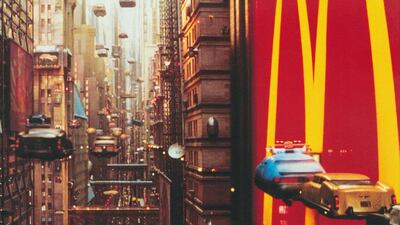No film captured a future with flying cars quite so completely as The Fifth Element, Luc Besson’s 1997 movie.
New York City yellow cabs, police cars and commuters all shared the 23rd century skyscape in relative harmony. Or they did, until Bruce Willis’s taxi arrives to wreak havoc.
Sadly, for every child who has grown up dreaming of one day commanding their own flying machine, such a scenario will remain consigned to science fiction, according to one of the smartest men on the planet.
Last month, Elon Musk, founder of Tesla and SpaceX, charmed a large audience at the World Government Summit in Dubai as he offered his views on everything from artificial intelligence and extraterrestrial beings, to space travel, and electric and self-driving cars.
But when it came to the future of cars, a network of tunnels under major cities, rather than flying vehicles, is the likelier way to solve future traffic congestion.
“You can always go deeper than you can go up,” Mr Musk said. “The deepest mines are deeper than the tallest buildings.
“Buildings are in 3D, and current roads are just one level. Tunnels could be multilayer, 50 storeys deep.
“The challenge is learning how to build tunnels quickly at low cost, with high safety.”
In the past, Mr Musk has used the 3-D analogy to argue against the existence of flying cars.
Before his appearance on stage, Mattar Al Tayer, chairman of Dubai’s Roads and Transport Authority, had given a presentation of an autonomous aerial vehicle that had been tested in Dubai and is set to be used as a taxi service later this year.
The Ehang 184 can carry one person, though its movement was more reminiscent of a drone or a small helicopter than a car. And while you could see such machines playing a useful role for the emergency services and for taxi rides for tourists, it’s hard to envisage a system of organised, functional three-dimensional traffic, such as the one in which Bruce Willis terrorised the New York City skies.
Two days after his Dubai appearance, Mr Musk restated his belief that flying cars will never take off.
“Obviously, I like flying things,” Mr Musk told Bloomberg’s Max Chafkin. “But it’s difficult to imagine the flying car becoming a scalable solution.”
The amount of thrust needed to get vertical take-off cars to move, it is argued, currently renders the ventures unfeasible in a commercial setting.
Above all, there is the primary issue of safety. Luc Besson might have played fast and loose with it, but who wants cars falling on top of their heads on a drive to the local supermarket? Two years ago, Mr Musk made this precise point.
“If there are flying cars, then you have added this additional dimension where a car could potentially fall on your head and would be susceptible to weather,” Mr Musk said.
“And of course you’d have to have a flying car that operates by autopilot because otherwise, forget it.
“There’s a fundamental flaw with cities where you’ve got dense office buildings and apartment buildings and duplexes, and they’re operating in three dimensions, but then you go to the street, and suddenly they’re two-dimensional.”
Self-driving cars, on the other hand, are a different proposition. Mr Musk believes that automated vehicles will be a way of life in the near future.
“Ten years from now all cars will be capable of full autonomy, with enough compute power to be safer than humans,” Mr Musk said.
“Getting in a car will be like getting in an elevator. You get in and you tell it where to go.”
Electric cars, he conceded, will take a bit longer, up to 50 years, to become commonplace, but he’s not waiting around.
Mr Musk introduced his new line of Tesla cars at Burj Khalifa’s Armani hotel.
There are 26 charging stations already available in the UAE – with superchargers at Masdar City in Abu Dhabi and Last Exit in Dubai.
“We expect to invest tens of millions of dollars in the UAE for charging, service and support infrastructures,” Mr Musk said. “By next year, you’ll be able to travel anywhere in the GCC with an electric vehicle.”
If Mr Musk’s vision comes true, the future will have more electric cars and many self-automated ones on our roads or in deep tunnels, but not as many flying ones.
Less The Fifth Element, more a journey to the centre of the Earth.
Ali Khaled is a freelance writer and editor in Dubai
On Twitter: @AliKhaled_

